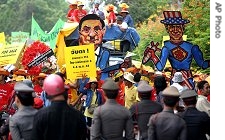Thailand’s bilateral trade pacts face mixed reception
Thailand’s Bilateral Trade Pacts Face Mixed Reception
By Ron Corben
Bangkok, 29 September 2005
Thailand has been aggressively negotiating bilateral and regional trade agreements in the face of the uncertainty over whether the World Trade Organization will reach a deal on liberalizing global trade. But, as some analysts say the agreements fail to live up to expectations of increased trade and investment.

Thailand’s government is well on the way toward reaching a free-trade agreement with the United States, having already signed an accord with Japan.
Thai Prime Minister Thaksin Shinawatra recently met with President Bush in Washington and discussed progress on a trade deal.
These free-trade agreements (FTAs) with Japan and the United States are among several similar deals Thailand has been pursuing to increase access to markets.
Like many governments, Thailand is eager to clinch such deals because of concerns over whether the World Trade Organization will be able to complete a global trade pact over the next few years. That effort is considerably behind schedule.
Thai officials say their first preference is a global WTO agreement.
"WTO - we have a setback there; probably it is not a collapse, it is just a long delay," said Winichai Chaemchaeng, a senior trade negotiator with the Ministry of Commerce. "FTA is not the best choice, but it is probably the second best or the third best. That is why Thailand embarked on this FTA."
But concerns over the trade agreements are widespread in Thailand, in part because of fears that different trading partners will exclude some business sectors.
Academics and farmer-rights organizations have warned that farmers and small companies are particularly vulnerable.
Buntoon Sethsiroth, is a director with the civic organization, FTA Watch. He says farmers in northern Thailand have been hard hit by an agreement Thailand has negotiated with China.
"The most serious impact is the garlic [farmers] in the northern [Thailand]," he said. "They abandon the farm, some part of the farm or abandon all the farm and convert to other crops."
Mr. Buntoon says his chief concern is that Thailand’s food security could be undermined by agreements that result in farmers moving to other crops or leaving the land altogether.
Kiat Sittheeman, an economist with the opposition Democrat Party, is critical of the government’s trade strategy. While Mr. Kiat acknowledges that FTAs may be a faster way to open trade than waiting for WTO action, he says little has been done to prepare Thai industries for change.
"Basically, the process to determine trade policy in the past four years has been questionable for me," he said. "It is pretty much top down and I think it’s lacking sufficient participation by the stakeholders, especially those affected. I have seen a lot of studies and I do not see a lot of solutions."
He says that fruit and vegetable growers in Thailand’s north are already complaining of being swamped by Chinese produce. Mr. Kiat points out that Thailand faces a trade deficit with China of up to $2.6 billion the end of this year.
"If we continue along this same line as I have seen during the past four years I would say the gap between rich and poor would be widening," he said.
Razeen Sally, a senior lecturer in international political economy at the London School of Economics, warns that to get a trade deal with the United States, Bangkok may end up being pressed into economic and business reforms that are unpopular with its citizens. And, he says, Thai negotiators may be so eager to get a deal with Washington that they do not receive enough U.S. concessions.
"If you look at the U.S. approach, there is a template, there are some pretty serious demands, there are little concessions on the American side, but they demand a lot going pretty deep into changing domestic institutions and regulations. It has happened with other countries and it is happening with Thailand," he said.
He says any changes would be more politically suitable if the Thai government initiated them, without pressure from outside.
Many governments have tried to ease the effects of trade agreements on vulnerable industries, but Thai farmers’ rights groups and analysts say such help has been has been slow or non-existent from Bangkok.
The analysts say a more aggressive government strategy to raise worker and industry quality and improve competitiveness are needed to ensure that increased trade competition will benefit the entire country.





